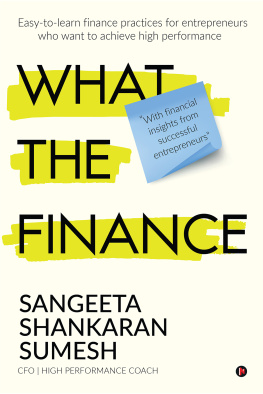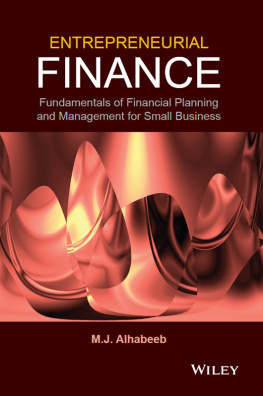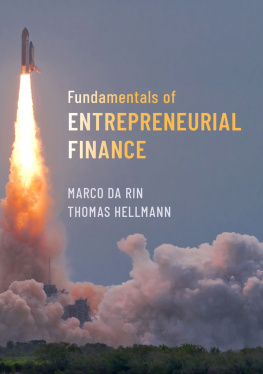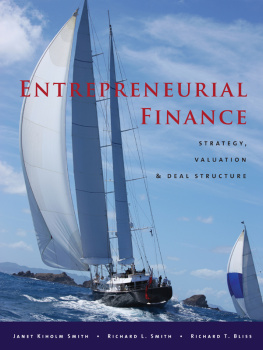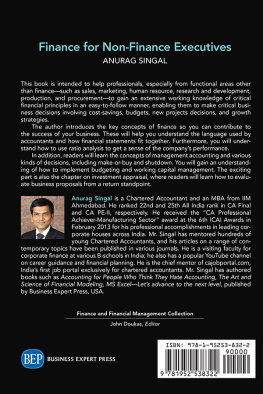Steven Rogers - Entrepreneurial Finance: Finance and Business Strategies for the Serious Entrepreneur
Here you can read online Steven Rogers - Entrepreneurial Finance: Finance and Business Strategies for the Serious Entrepreneur full text of the book (entire story) in english for free. Download pdf and epub, get meaning, cover and reviews about this ebook. year: 2008, publisher: McGraw-Hill Education, genre: Politics. Description of the work, (preface) as well as reviews are available. Best literature library LitArk.com created for fans of good reading and offers a wide selection of genres:
Romance novel
Science fiction
Adventure
Detective
Science
History
Home and family
Prose
Art
Politics
Computer
Non-fiction
Religion
Business
Children
Humor
Choose a favorite category and find really read worthwhile books. Enjoy immersion in the world of imagination, feel the emotions of the characters or learn something new for yourself, make an fascinating discovery.

- Book:Entrepreneurial Finance: Finance and Business Strategies for the Serious Entrepreneur
- Author:
- Publisher:McGraw-Hill Education
- Genre:
- Year:2008
- Rating:5 / 5
- Favourites:Add to favourites
- Your mark:
- 100
- 1
- 2
- 3
- 4
- 5
Entrepreneurial Finance: Finance and Business Strategies for the Serious Entrepreneur: summary, description and annotation
We offer to read an annotation, description, summary or preface (depends on what the author of the book "Entrepreneurial Finance: Finance and Business Strategies for the Serious Entrepreneur" wrote himself). If you haven't found the necessary information about the book — write in the comments, we will try to find it.
Entrepreneurial Finance: Finance and Business Strategies for the Serious Entrepreneur — read online for free the complete book (whole text) full work
Below is the text of the book, divided by pages. System saving the place of the last page read, allows you to conveniently read the book "Entrepreneurial Finance: Finance and Business Strategies for the Serious Entrepreneur" online for free, without having to search again every time where you left off. Put a bookmark, and you can go to the page where you finished reading at any time.
Font size:
Interval:
Bookmark:
ENTREPRENEURIAL
FINANCE
FINANCE
Finance and Business Strategies for the Serious Entrepreneur
Second Edition
STEVEN ROGERS
Gordon and Llura Gund Family Professor of Entrepreneurship
Director, Larry and Carol Levy Institute for Entrepreneurial Practice
J.L. Kellogg School of Management, Northwestern University
WITH ROZA MAKONNEN


Copyright 2009 by The McGraw-Hill Companies, Inc. All rights reserved. Except as permitted under the United States Copyright Act of 1976, no part of this publication may be reproduced or distributed in any form or by any means, or stored in a database or retrieval system, without the prior written permission of the publisher.
ISBN: 978-0-07-159127-0
MHID: 0-07-159127-3
The material in this eBook also appears in the print version of this title: ISBN: 978-0-07-159126-3 MHID: 0-07-159126-5.
All trademarks are trademarks of their respective owners. Rather than put a trademark symbol after every occurrence of a trademarked name, we use names in an editorial fashion only, and to the benefit of the trademark owner, with no intention of infringement of the trademark. Where such designations appear in this book, they have been printed with initial caps.
McGraw-Hill eBooks are available at special quantity discounts to use as premiums and sales promotions, or for use in corporate training programs. To contact a representative please visit the Contact Us page at www.mhprofessional.com .
This publication is designed to provide accurate and authoritative information in regard to the subject matter covered. It is sold with the understanding that neither the author nor the publisher is engaged in rendering legal, accounting, or other professional service. If legal advice or other expert assistance is required, the services of a competent professional person should be sought.
From a Declaration of Principles jointly adopted by a Committee of the American Bar Association and a Committee of Publishers.
TERMS OF USE
This is a copyrighted work and The McGraw-Hill Companies, Inc. (McGraw-Hill) and its licensors reserve all rights in and to the work. Use of this work is subject to these terms. Except as permitted under the Copyright Act of 1976 and the right to store and retrieve one copy of the work, you may not decompile, disassemble, reverse engineer, reproduce, modify, create derivative works based upon, transmit, distribute, disseminate, sell, publish or sublicense the work or any part of it without McGraw-Hills prior consent. You may use the work for your own noncommercial and personal use; any other use of the work is strictly prohibited. Your right to use the work may be terminated if you fail to comply with these terms.
THE WORK IS PROVIDED AS IS. McGRAW-HILL AND ITS LICENSORS MAKE NO GUARANTEES OR WARRANTIES AS TO THE ACCURACY, ADEQUACY OR COMPLETENESS OF OR RESULTS TO BE OBTAINED FROM USING THE WORK, INCLUDING ANY INFORMATION THAT CAN BE ACCESSED THROUGH THE WORK VIA HYPERLINK OR OTHERWISE, AND EXPRESSLY DISCLAIM ANY WARRANTY, EXPRESS OR IMPLIED, INCLUDING BUT NOT LIMITED TO IMPLIED WARRANTIES OF MERCHANTABILITY OR FITNESS FOR A PARTICULAR PURPOSE. McGraw-Hill and its licensors do not warrant or guarantee that the functions contained in the work will meet your requirements or that its operation will be uninterrupted or error free. Neither McGraw-Hill nor its licensors shall be liable to you or anyone else for any inaccuracy, error or omission, regardless of cause, in the work or for any damages resulting therefrom. McGraw-Hill has no responsibility for the content of any information accessed through the work. Under no circumstances shall McGraw-Hill and/or its licensors be liable for any indirect, incidental, special, punitive, consequential or similar damages that result from the use of or inability to use the work, even if any of them has been advised of the possibility of such damages. This limitation of liability shall apply to any claim or cause whatsoever whether such claim or cause arises in contract, tort or otherwise.
Chapter 1
The Entrepreneurial Spectrum
Chapter 2
The Entrepreneur
Chapter 3
The Business Plan
Chapter 4
Financial Statements
Chapter 5
Financial Statement Analysis
Chapter 6
Cash Flow Management
Chapter 7
Valuation
Chapter 8
Raising Capital
Chapter 9
Debt Financing
Chapter 10
Equity Financing
Chapter 11
Financing for Minorities and Women
Chapter 12
Taking a Job with an Entrepreneurial Firm
Chapter 13
Intrapraneurship: Corporate Entrepreneurship
It is morning at Opryland in Nashville, Tennessee, a place where young crooners from Charlie Pride and Johnny Cash to Garth Brooks and the Dixie Chicks have realized their dreams. Not far away is the Grand Ole Oprycountry musics equivalent of the Broadway stageand a full day of work is about to begin. But this morning, the visitors have business, not music, on their minds. This is a conference for future entrepreneurs from around the country. Their schedules are packed with seminars on financing, marketing, and operations. Here is a sample: Business Start-Up Essentials, How to Find Money-Making Ideas, and Designing Products.
Of course, none of this would be particularly noteworthy except when you consider that these conventioneers are aged seven to tenand they are not the youngest group here. There is another set of entrepreneur seminars for kids aged four to six. Its called the Kidpreneurs Konference, sponsored by Black Enterprise magazine and Wendys, and this sixth annual event is a sellout. Nearby, the kids parents, all entrepreneurs or future entrepreneurs themselves, are packed into their own seminars. If there ever was a doubt that this is the glory age of the entrepreneur, a few days with these titans of tomorrow should put that notion to bed.
I write this book, this story of opportunities, because I have been blessed with so many of my own. Its said that a good entrepreneur always sees sun in the clouds and a glass half full. My wife, Michele, and my daughters, Akilah and Ariel, laugh at me when I tell them that I have gone through life always believing that when I walk through a door, the light will shine on me, no matter who else is in the room. Like every good entrepreneur, I believe in myself, but I also have enough humility to know that one does not go from the welfare rolls on Chicagos South Side to owning three successful companies, sitting on the boards of several Fortune 500 companies [S. C. Johnson & Son (formerly S. C. Johnson Wax), SuperValu, AMCORE Financial, and Harris Associates, a $60 billion mutual fund], and teaching at the finest business school in America without a healthy supply of luckand a handful of caring people.
The first entrepreneur I ever met was a woman named Ollie Mae Rogersthe oldest daughter in a family of 10 kids, and the only one among them who never graduated from high school, let alone college. Fiercely independent, she left home at the age of 17 and got married. The marriage, I believe, was simply an excuse to leave home. Leaving home meant that she got her independence, and if she was nothing else, Ollie Mae, my mother, was a fireball of independence. When my older brother, my two sisters, and I buried her a few years ago, the eulogy fell to me. I described my mother as a Renaissance woman filled with paradoxes. She was a tough and gutsy woman whose extensive vocabulary flowed eloquently although she barely finished the tenth grade.
Next pageFont size:
Interval:
Bookmark:
Similar books «Entrepreneurial Finance: Finance and Business Strategies for the Serious Entrepreneur»
Look at similar books to Entrepreneurial Finance: Finance and Business Strategies for the Serious Entrepreneur. We have selected literature similar in name and meaning in the hope of providing readers with more options to find new, interesting, not yet read works.
Discussion, reviews of the book Entrepreneurial Finance: Finance and Business Strategies for the Serious Entrepreneur and just readers' own opinions. Leave your comments, write what you think about the work, its meaning or the main characters. Specify what exactly you liked and what you didn't like, and why you think so.


